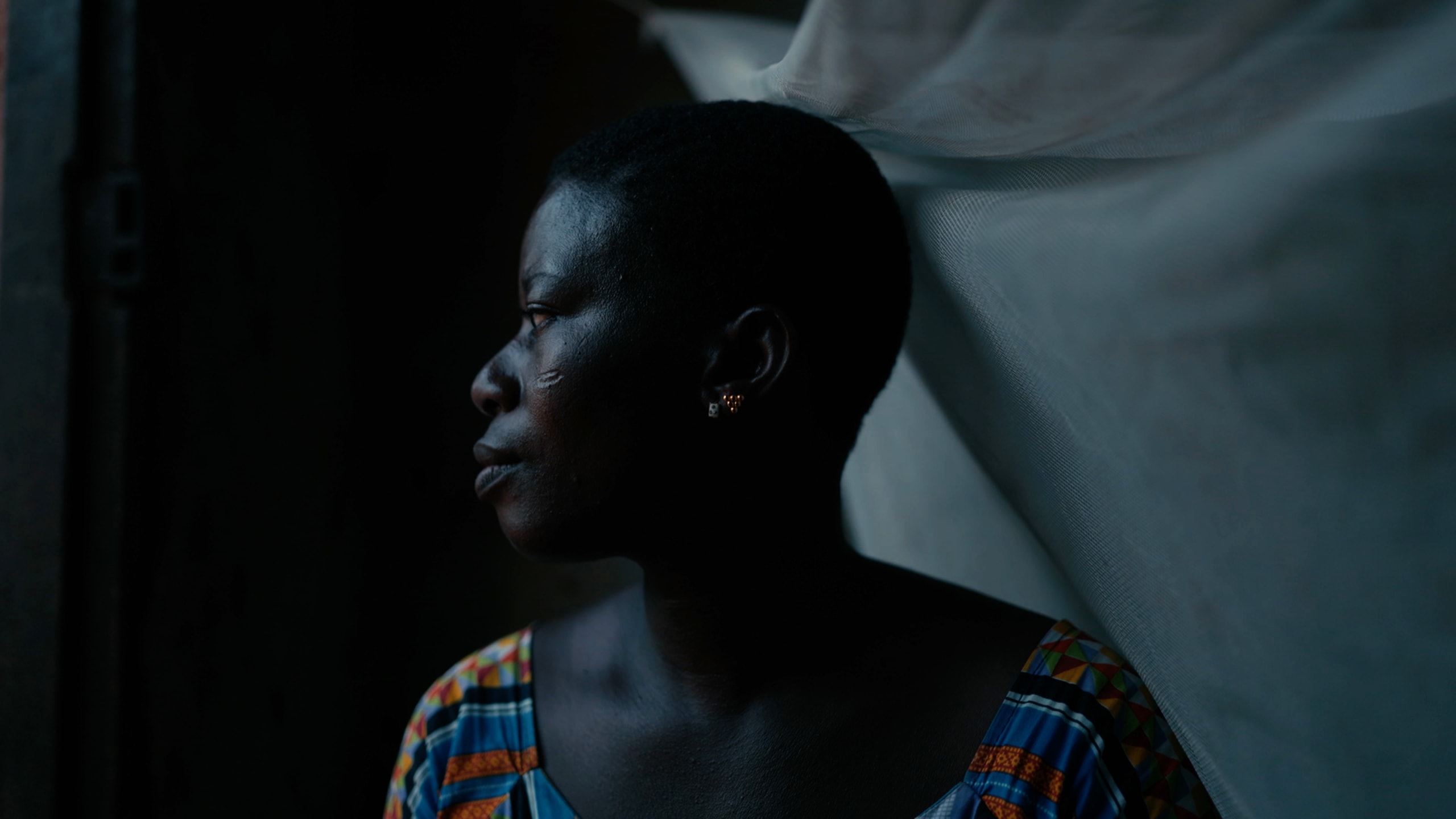The door clicks shut. You lean against the threshold with the whirlwind of school pick-up, homework, dinner, bath time and bedtime behind you. Whew.
Your partner bends over the notice that came in the mail today. And in the space between your exhale and inhale, you step back into the responsibility of parenthood.
One, two, three steps over to the chair beside the desk.
“What are we going to do?”
It’s a closed-door conversation. One of those significant conversations where parents have to navigate crises, problem-solve or process their own stress without burdening their children. Life can be hard, and as a parent, you will do all you can to ensure the well-being of your kids.
No matter the subject of the conversation—finances, work, health, school, family—they will happen at some point in life, all in the earshot of God. These questions and seemingly endless conversations are their own form of lament. They are the moments as a parent when you fall on your knees and ask of God, “What are we going to do?” Because you love your kids.
This experience is universal to parents all around the world.
Parents like Aboni and Ayitevi in Togo have had many of these conversations as they try to navigate severe drought and the impact it has had on their family.
Let’s listen in…
Psalm 13: Aboni and Ayitevi’s Story
How long, Lord? Will you forget me forever?” (v.1)
“The only thing I could do was bless the water, Aboni,” Ayitevi whispered. “It was the only thing I could do for dinner, and the kids are going to bed hungry again.”
The weight of their circumstances pressed down on Aboni. Things had changed drastically during the past couple of years. Work, opportunities, even gardening—all impacted in one way or another by uncontrollable circumstances such as drought and inflation.
“It’s all you could do, Ayitevi. We will work as hard as we can to get our family through this.”
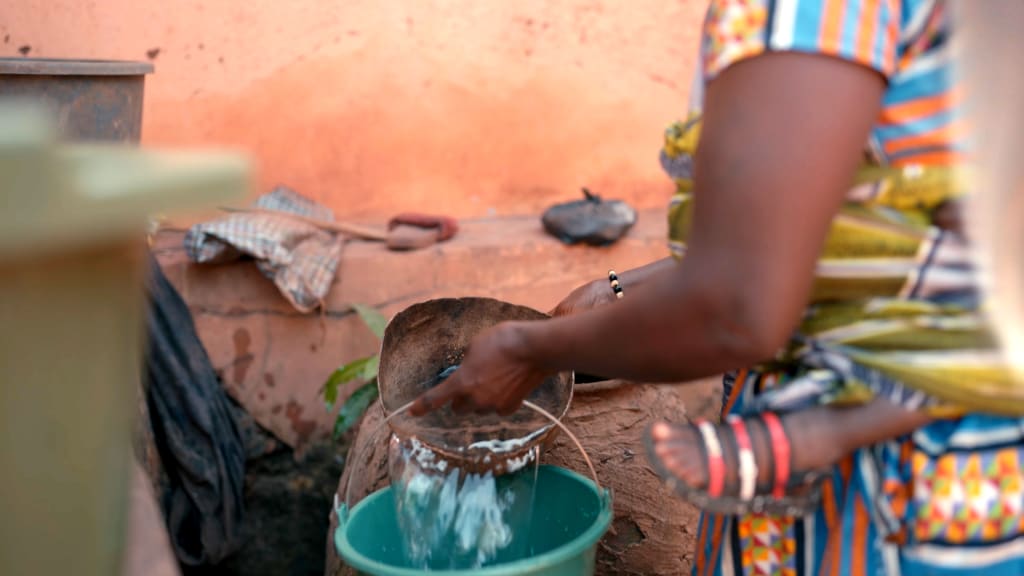
Ayitevi blesses the water.
“How long will you hide your face from me?”
She sat on the edge of the bed and squeezed her eyes tightly closed. Aboni sat down with a sigh.
“The only thing we can tell them is that brighter days will come,” Aboni reassured Ayitevi. She reached over to grab his hand and held tight.
“How long must I wrestle with my thoughts?” (v.2)
Buttery yellow sunbeams cut through the small window as Ayitevi rolled over on the bed mat to find Aboni staring at the ceiling. His eyes were red, and his face was drawn.
Another sleepless night, she thought first and then quietly said aloud.
“I’ve never felt pain like this. Ayitevi, I can’t even provide supper for our family. It keeps me up night after night…”
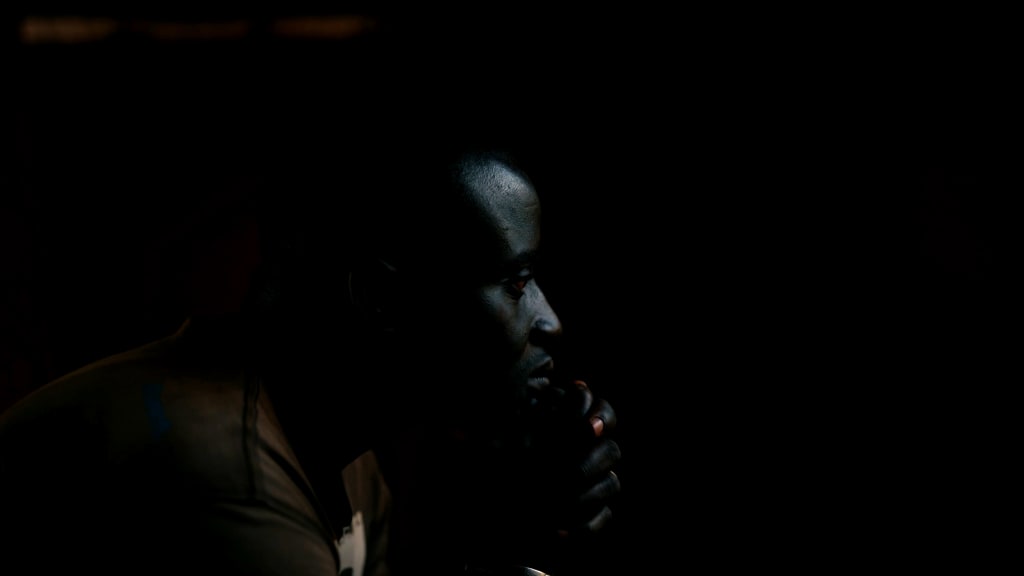
Aboni prays in the dark of night for his family.
“How long will my enemy triumph over me?”
“The prices are increasing again.” Ayitevi dropped her woven basket to the floor with a hollow plunk. “Corn, oil, everything is up. What about farming, Aboni?”
“I don’t know, Ayitevi. The last time I was in town, I checked, and the price of fertilizer had risen too. We can’t afford the fertilizer, but we have to try to grow some food so that the kids can eat.”
“Look on me and answer, Lord my God.” (v.3)
A handful of tiny husks tumbled onto the table in front of Ayitevi. Sparse and weather-worn corn—the evidence of depleted and dry soil.
“Nothing I do is working. I can’t tell the kids to hope for brighter days anymore when I can’t grow or buy food. I don’t know what to do,” Aboni clasped his hands on the table in front of Ayitevi.
A long, shaky breath filled the silent room. Ayitevi’s eyes filled with tears. “Aboni, the kids ask me what is for dinner every evening. I can’t bear to give them water again and tell them we can’t provide for them. I can’t…” she choked; her shoulders shuttered. “They ask, ‘why have you not cooked food for us today?’”
Aboni reaches across the table to take his wife’s hands. He keeps his head bowed as tears flood his own eyes. “They ask me the same.”
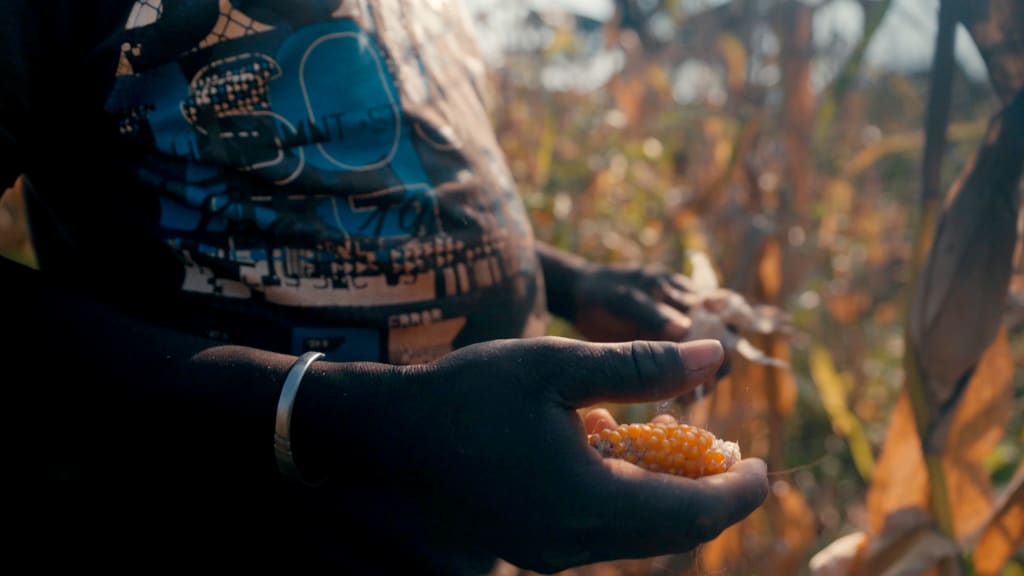
Aboni holds corn from his garden.
“…But I trust in your unfailing love;” (v.5)
“Aboni, I stopped by the church,” Ayitevi steps over the dry stalks of corn on the ground, using her arms to part a curtain of the stalks still standing. “They have a program for children there, and they say we can register Felix,” Ayitevi presses on as she sees Aboni’s black shirt a few more steps away.
He had turned to face her now and could see how her face lit up as she took the last few steps to reach him. “What is the program?” Aboni asked.
“Compassion,” Ayitevi replied. “This could change our story, Aboni! The other mothers told me that they help provide food kits for the families of the children at their program and that they have helped other parents find stability in their businesses. My friend Ruth was there, and she’s seen the food kits they deliver, Aboni. She told me about it. I think we should register Felix. He will gain so much from the church, and this will make all the difference.”
Aboni looked up at the sky—more expansive than he could take in—and then looked back at his wife.
“Okay, let’s find out more.”
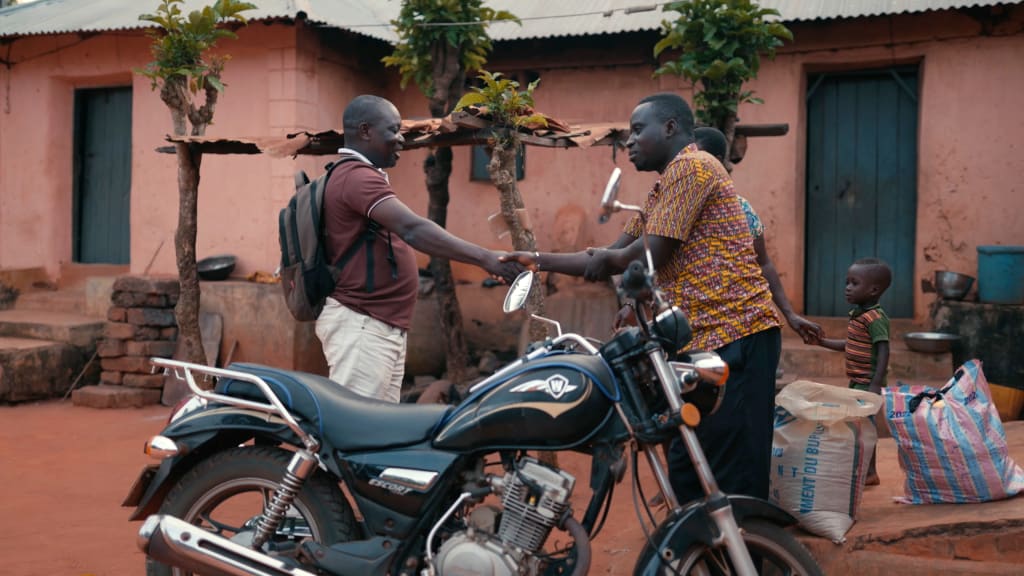
Aboni speaks with the Compassion staff member who dropped off the food kit.
“I will sing the Lord’s praise, for he has been good to me.” (v.6)
Aboni shuffled inside with his arms overflowing. A heavy bag of maize was drooping precariously over his left arm, while a big bottle of golden oil sloshed loudly in his right. Various smaller items shifted and eventually tumbled out of his arms onto the table as he reached his destination.
Ayitevi’s eyes danced, and a laugh tumbled out of her as she surveyed how their life had changed. She could hear her youngest, Felix, chattering loudly with the Compassion staff member who was climbing on his motorbike to leave.
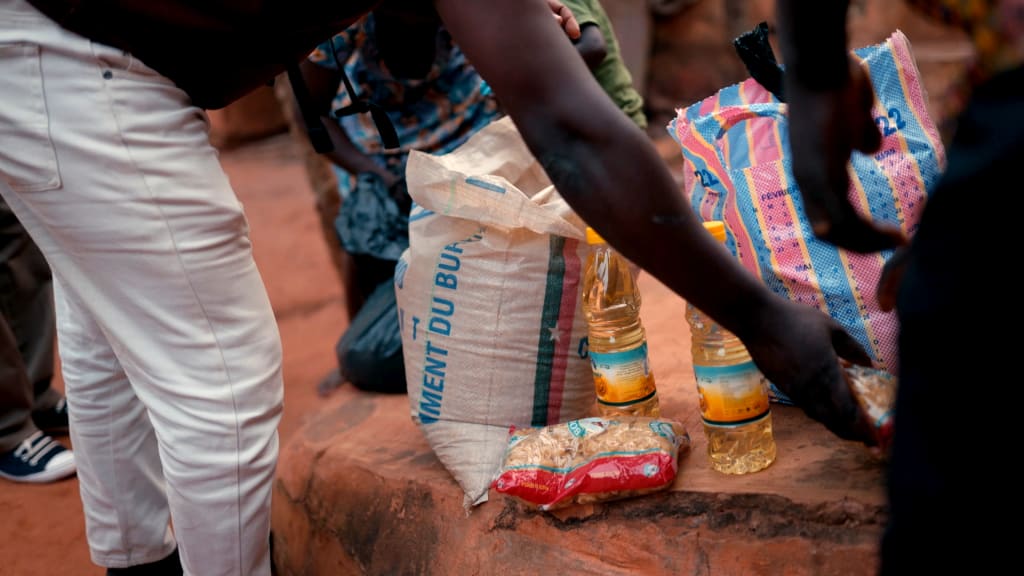
Some of the items included in the food kit that Compassion delivered.
Aboni looked down at the food kit Compassion had provided. “God always provides,” he said over the puttering of a motorbike driving away.
“He does,” Ayitevi nodded and peered out the door at her son waving goodbye to the Compassion staff member. “And it is through this child that God will change our story,” she lifted her chin to say as Felix walked into the room.
“Mama, Papa,” Felix’s young voice chimed. “What’s for dinner?”
Aboni and Ayitevi looked down at the food that filled their table and up at each other as they smiled. A wordless conversation between them.
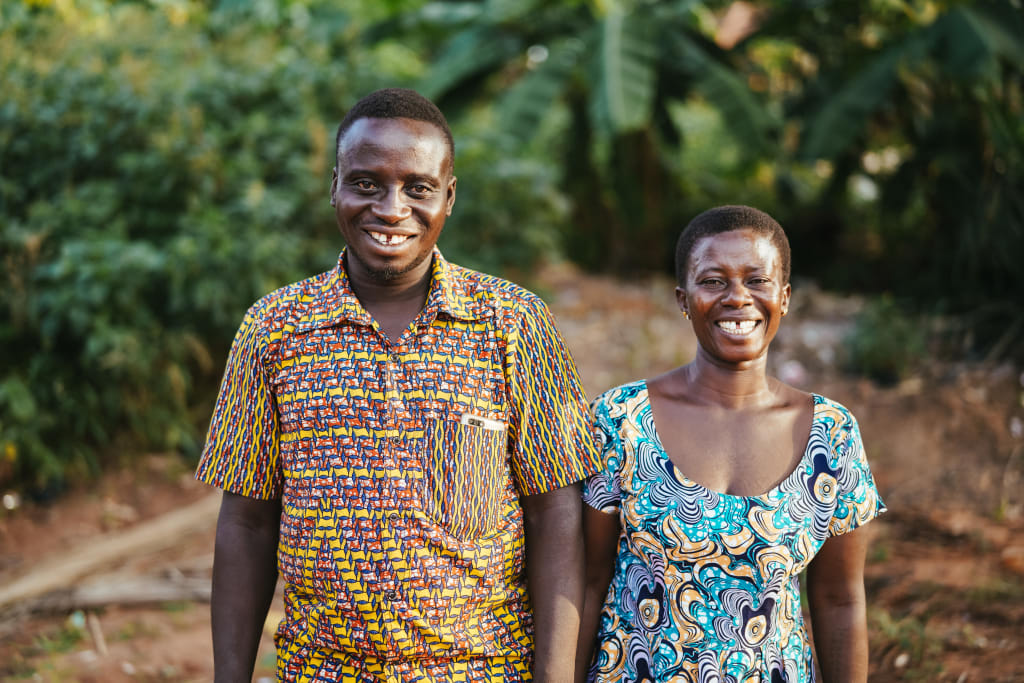
Around the world, parents like Aboni and Ayitevi are having to navigate the immense pressure of trying to feed their families when the odds feel stacked against them.
For many, the fight against hunger feels hopeless. But together, we can change the story when we move with compassion.
We end hunger when we move with compassion.
Photos and video by Roy Radido and Kyle Jaster.

